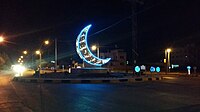Ramadan tent

A Ramadan tent is a venue erected during the month of Ramadan for people to eat the daily Iftar meal. They are common across the Middle East and can be found anywhere there are communities of Muslims. Ramadan tents provide a place for people to meet with friends and family after the daily fast is broken at sunset. People gather there to eat Iftar, drink tea, and smoke shisha. Ramadan tents are traditionally a family or neighborhood affair in the Middle East.[1][2] A Jordanian journalist described a typical Ramadan tent thus in 2008:[3]: 66
Under the fluffy colorful ceiling of the big tent, you can treat yourself and friends to various types of sweets, entertainment and distraction until the very early hours of the morning, while playing game after game of cards. A musical band with a leading singer can play classical pieces of Arab music. ... Waiters are dressed in special 19th- or 18th-century attire with the red cylinder-shaped hat better known as "
argeelah, a rich assortment of little snacks.— Salim Ayoub Quna
In recent years, restaurants and hotels have begun running Ramadan tents to attract customers. Most luxury hotels (4- or 5-star) hotels in
Maybe the tent is a symbol of open space and freedom of movement that our modern way of life in the city is stripped of ... Living in peace, quiet, and close to nature makes you feel closer to God and religion, and since I miss these things in my real life out there, being here under this tent restores part of the harsh imbalance.
— Salim Ayoub Quna

In contrast to this materialism, some charitable organizations and individuals host free Ramadan tents that are open to strangers, especially the poor and those who otherwise have nowhere to go for Iftar.
History
Ramadan tents are a relatively recent tradition, and they do not date back to the origins of the holiday.
References
- ^ a b Khan, Aina (June 8, 2018). "Open Iftar tent attracts hundreds in the UK". Al-Jazeera. Retrieved 28 June 2018.
- ^ a b Dajani, Haneen (May 6, 2018). "This man's Ramadan tent has been feeding hundreds a day for 25 years". The National. Retrieved 28 June 2018.
- ^ ISBN 9781501704185.
- ^ Zaki, Yousra (May 24, 2018). "18 Ramadan tents to try in the UAE". Gulf News. Retrieved 28 June 2018.
- ^ Hamouda, Nada (May 22, 2018). "Here Are 7 Of New Cairo's Most Stunning Ramadan Tents!". Scoop Empire. Retrieved 28 June 2018.
- ^ a b "The changing face of the Ramadan tent". Morocco World News. Al-Arabiya. July 30, 2012. Retrieved 28 June 2018.
- ^ Suliman, Adela (June 7, 2018). "Strangers break bread at Ramadan tent in London park". Thomson Reuters Foundation. Retrieved 28 June 2018.
- ^ Prichep, Deena (June 11, 2017). "This Dinner Party Invites People Of All Faiths To Break Bread Together". NPR. Retrieved 28 June 2018.
- ^ a b الظاهري, ناصر (July 20, 2014). "خيمة رمضان". الإتحاد. Retrieved 28 June 2018.

